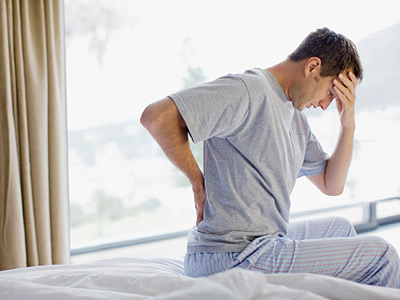The lower back, which starts just below the rib-cage is called the lumbar region. This area is prone to various injuries and resulting pain, ranging from mild to severe. Lower back pain is more common than most think, affecting about 60% – 80% of people in the UK at some point of their lives. In the UK, back pain is close behind the common cold as the most common cause of missed work days.

Research by the British Chiropractic Association found that 48% of people in Britain suffer from back pain or neck pain at any one time. While back pain is quite common among adults, the severity and the symptoms associated with it vary greatly. The symptoms could range from mild aches to sharp muscle spasms and the severity could be as mild as simple discomforts or as extreme as needing a visit to the emergency room or even disability.
Effects of Back Pain on Sleep Patterns
Mild back pain is pain that lasts for hours or a few days at most while chronic back pain is described as pain that has persisted for more than 12 weeks. Whether chronic or mild, lower back pain can make it difficult for you to sleep and studies have shown that not getting enough sleep can increase your sensitivity to pain.
It usually goes away on its own but when it doesn’t, it could leave you in bed for days and absent from work.
Being bedridden is one thing, not being able to sleep while in bed is another thing entirely and this is a common complaint of people afflicted with lower back pain. Apart from the direct physiological effects of lower back pain on your sleep, other related problems like anxiety and depression can make it hard for you to fall asleep or stay asleep when you do eventually get some sleep.
Put bluntly, lower back pain affects your sleep and even your mild rests or naps. There is no certain way or position of sleeping that comes to mind when you have lower back pain; the only certainty is that you need more sleep, not just want it. In reality, sleep, the believed solution that should alleviate the back pain can become one of the contributors to the pain we experience.
It is true that adequate sleep, along with proper medication and therapy is necessary for recovery and rehabilitation but it is also true that too much sleep can adversely affect your delivery.
Too much sleep or rest can lead to further immobility and stiffness with poor healing and recovery since lower back pain is directly linked to mobility of the trunk region.
While it is important to get adequate sleep, it should not be considered as the biggest part of your treatment or recovery process. The major part of the rehabilitation process should be dealing with the weakness and deterioration of discs in your spine, along with trunk mobility, muscle conditioning and flexibility.
Lower back pain affects people’s movements, causing them to be cautious and reluctant to engage normally or frequently in their daily activities. If the pain does not manifest immediately, it might manifest hours later. This vicious cycle can be broken.
Problems sleeping due to back pain can be relieved with the following measures:
Sleeping on a firm mattress or surface; sloping or sagging mattresses should immediately be discarded and replaced
Sleeping on your side in the fetal position; this helps to stretch the joints in the spine and relieve pressure by reducing the curvature of the spine.
Lower back pain should never be overlooked or left to fester but proactive measures should be taken to combat it for healthy living. For more information about treating back pain and getting more sleep, call Fulham Chiropractic today
